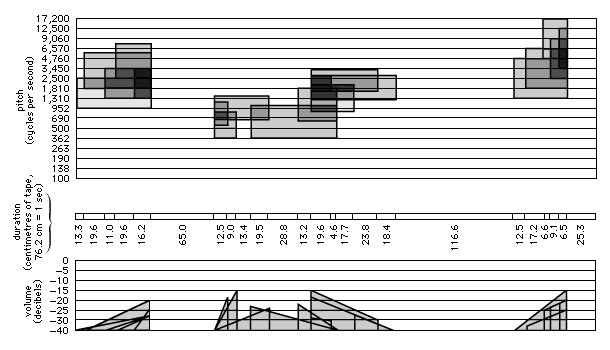distante® escribió:
"(...) you don't need experience (...) If you aspirations are to make this kind of collage efford records"
La charla de Darío Dendi fue demasiado inspiradora para mi, y es la forma en que veo a un productor.
Por cierto, Steve Albini esta hablando del modelo que Carmelopec defiende en su post inicial, y por la forma que explica la "otra forma", no parece defenderla, solo decir que existe, y (una vez más) sigue hablando del Productor de la manera que lo entendemos los "no djs".
Hola Distante,
Creo que estas interpretando mal sus palabras y que las frases que has sacado de contexto han perdido por completo su significado real.
Te voy a poner unos extractos de otras entrevistas de Steve Albini, a lo largo de los años, en diferentes medios para que veas cual es su opinión real sobre la producción y la industria discográfica en general:
-
Sobre la producción, los productores, y la visión de su papel en las grabaciones:
Alguien escribió:
MRR #112 : Do you consider yourself a "producer"?
Steve Albini: No. That has been a cause of irritation with some labels that I've dealt with because the bigger labels are used to working with industry people.
And there are things about the way those people do business that I want nothing to do with. Those people insist on being credited on the records and taking a royalty off of it. They get paid huge sums of money and have little responsibility and do whatever the hell they want.
I think that the bands are far more important than anyone inside of the industry. So I won't take a royalty on a record for example. I think it is an insult to the band to say that because I recorded this album and not somebody else you're selling more records and therefore I want a cut. I won't do that.
When I think of a producer I think of one of those industry losers with a beard and a ponytail sitting in a chair telling the band what to do. I've heard stories of bands that have been together for like ten years going into a studio and having the producer tell them that their drummer just isn't good enough so he's going to bring in a session man. I just can't understand that. I think that a band as a unit is a sacred thing. Those guys figured out what they want to play, wrote all their songs and stored all that stuff in their heads.
Alguien escribió:
NSR: You don't like to be called a "music producer" - why not?
Steve: I get this question quite often. It's simply because a record producer is a job description and i'm not a record producer. Record producers mainly get royalties just as if the producers were part of the band that are recording. I never demand any royalties from the records I helped to produce. If I charge something then it's just my time spent with the band. Other then that I don't demand anything
Esta claro en base a estas respuestas (unido a lo que comenta en el vídeo) cual es su opinión, sobre la figura "tradicional" de el productor,tal y como se define en el inicio de este Hilo, y esta claro que ese papel es el que
NO quiere tener nunca en un disco
Respecto a las producciones comerciales o "mainstream"
Alguien escribió:
-It seems though, if you look at artists like Lady Gaga, they seem to intentionally just focus on that sort of thing.
I’m an exceptionally lucky man in that I’ve never heard a note of Lady Gaga’s music and you could sit her on my lap and I wouldn’t recognize her. I know that she’s a cultural force at the moment but I’m quite satisfied in having dodged that one. It’s like a truck drove by spraying shit from a nozzle over the entire neighborhood and I happened to be under an awning. You know?
What it boils down to is that I’ve maintained a scrupulous cultural ignorance since about 1985 when I realized that what’s going on out there in the regular world means nothing to me. If it’s not being done by people I can identify with in some way or people that say something that punches through the distance between me and them and makes me pay attention to it. If it’s not that, if I don’t find it rewarding then I’m not going to spend any energy trying to think about it. There was a period there, in the ‘90s, when people who were my friends even, started trying to rationalize an appreciation of mainstream pop music. Bullshit like Madonna and that fuckin’ Cher single that was everywhere...
-“Believe.”
Right. Shit like that, people would pretend that it somehow lessened me as a person that I had no connection with this shit that I despised. Saying that this stuff is culturally significant, that it’s going to influence arts and letters for decades. Well I’m not going to read any of those letters then and I’m certainly not going to watch any of that art. I’m not going to give a shit about that. I don’t care. I don’t care what influence Fonzi has had on music, art, and sculpture. I’m not interested in that music, art, and sculpture. I mean, to use a dated metaphor there. Fonzi. The entertaining thing about that is that it was the beginning of the snake swallowing its tail of retrograde nostalgia that we’ve been wallowing in ever since.
Alguien escribió:
What do you consider “horrible music?” Like, what would be some of the first bands that come to mind?
I just don’t even think about bad music anymore. It just doesn’t even register. It sounds like I’m ducking your question, but in all honesty I just don’t pay any attention anymore to things that don’t appeal to me. I think that might be why I’m not as annoyed by things as I used to be — I’m now quite effective at completely shutting them out.
Así que paree mas que evidente que el NO se esta refiriendo a ninguno de estos "productores", en solitario, propios de el "mainstream" o e el mundo de el R&B, el Rap,etc... ya que no es un estilo que a el le diga absolutamente nada, pero por el contrario cuando el habla de "collages" lo hace refiriéndose a otra cosa muy diferente...a esto:
Alguien escribió:
You're quite against people embelishing their records with samples and stealingother people's ideas, yet in your other capacity you work away at improving people's work i.e. making something sound better than it is. How can you reconcile the two?
My actual work ethic is based on making things sound exactly as they are, with the intention of letting the artist's technique and execution do the work. I never feel guilty about making a record sound as good as it possibly can. I don't really understand your question, in that you are implying that stealing other people's ideas or sampling someone else's actual record is a necessary part of making a good record. That position is ludicrous.
Alguien escribió:
"But even at his most extreme, Brian Eno didn't manipulate records as much as any sophomore in college does these days the moment he gets a Pro Tools rig. The manipulation capabilities of the digital editing programs are now so elaborate that sonic manipulation has become a cliché. I don't see the studio as a laboratory as more important than the band as a performing unit. Anyone can do whatever he wants in the studio — I would never say 'No, you're not allowed to do this.' But in the same way that not every movie should look like Star Wars, I don't think every record should be manipulated to the extent that they often are. I don't understand where the impulse comes from to make a record that doesn't have any relationship to the sound of the real band. That seems crazy to me."
Alguien escribió:
I was talking to a young engineer who described a process of recording a large group where every piece has its own track and overdub. It's a whole different methodology than tracking live.
That's more of deconstructed thing. Whereas, if that 12-piece band is capable of setting up and playing their song then you wouldn't need to do that. You would only do that if, for some reason, you'd perceived that as being better.
-Those Phill Brown stories about the Talk Talk records...
Yeah, there's a big thing on the Electrical forum about that! I have to admit, I'm not a fan of Talk Talk. Those records don't seem amazing to me. They sound okay. Nothing special. But when I read the convoluted bullshit they went through to make those records, how could I not think less of them? How could I not think of them as pointlessly indulged children? It just seems trivial. If I hear a record and that record blows my mind and then I find out that they went through some extraordinary measures to make that record, then I would feel that it was justified in some way. But when I hear a record and feel that it's okay, like the Metallica Black album, I hear and think, "It took you a fucking year to make that record? Seriously?"
En realidad lo que sucede es que Steve Albini considera que no es necesario emplear nunca mas de 10 días para grabar un disco, por complejo que este pueda ser, ya que el cree innecesario "embellecer" las grabaciones en exceso, y solo podría justificarlo en el caso de que el resultado terminase pareciendo le "impresionante".. cosa que no sucede, unido a que por otro lado, hoy en día, se tiende a procesar en exceso las grabaciones de rock, llegando a un nivel de procesado y abstracción de la realidad y del sonido de el propio grupo( incluso superior a el de ciertos discos "mainstream" de el pasado), cosa que simplemente le parece una completa locura.
Sobre la industria discográfica tradicional y el futuro
Alguien escribió:
You wrote an article in the early 1990s called "The Problem With Music" http://www.negativland.com/albini.html that explored parasitism of the music industry and the economic issues with the top-down model—Does that model even exist anymore, in this new era of digital downloads, iTunes, Pitchfork, and viral trends where bands have to shamelessly promote themselves online to get ahead?
This is a terrific time to be in a band. Every band has access to the entire world by default. I know quite a few bands that have been able to establish themselves internationally based on nothing other their web presence. It's an incredible tool. It's also revived the careers of a lot of bands that came before the Internet era and never had enough penetration to find their natural audience. But because the music survived, some people were interested in disseminating it for no other reason than because they like it. People put stuff on YouTube or torrent clients or whatever, not because they're going to make money off of it, which is the only reason the mainstream industry would do something, but because they think it's good. It's a like a worldwide mix tape. An awful lot of bands that had no audience in their first incarnation were able to revive their careers and have a second lap. It's so exceedingly rare that somebody gets more than one bite at an apple like that. I think it's fantastic.
Alguien escribió:
* What are you thoughts about file sharing/music streaming outlets like Youtube, Spotify, gogoyoko, Facebook, Vimeo, Bandcamp, etc. and how do you think it affects labels and artists?
They’re all different, but the ones with less interference from corporate interests are awesome. Bandcamp is pretty amazing in that it allows bands to make their music available in precisely measured doses at their discretion, and also allows them to sell it. Facebook seems like it’s grooming everybody to be a marketing tool rather than a networking site. I don’t mind things like YouTube and Vimeo, but when YouTube acts like a cop and removes content because somebody claims copyright over it then it’s actually an obstacle to building an audience. I’m a proponent of people being allowed to share their musical interests freely with each other. All the industry attempts to control the dissemination of music on the internet are misguided because their intent is to make it harder for people to discover and listen to music they might like, and this is at odds with the intent of bands, which is to build an audience of people who have discovered their music and like it. The argument that every instance of that needs to be a commercial enterprise is preposterous and goes against normal social instincts.
Alguien escribió:
:" The music industry has changed in that it’s no longer the record industry. The record industry is dead. What does exist is the music industry where things like Live Nation and the corporate concert arenas and venues are trying to take over band management in the same way record labels did, and that’s why it’s important for independent venues to survive and bands continue to do things independent of that music industry.
The record industry is dead and gone. It’s never going to come back. Bands will continue on. They will continue to have healthy careers. But selling records is going to be a very small part of that. It’s going to be more about playing live and having direct interaction with your fans through websites and shit like that."
Así que según todo esto difícilmente podremos llegar a considerar a Albini como un defensor de la figura tradicional de el productor frente a otras "nuevas" visiones de la producción, ya que en realidad su mensaje va mucho mas allá que todo eso y por que en realidad, el nunca ha visto la producción tradicional como algo forzosamente positivo, e incluso necesario, al igual que tampoco nunca ha creído en la industria musical tradicional ni en sus estructuras de funcionamiento.
Respecto a el tema de tu amigo Francés, lo unico que puedo decirte, es que por un lado es libre de pensar lo que quiera, al igual que el resto de personas, la referencia a la "Musique concrète" así como a la música electrónica de laboratorios como el de Colonia, solo era para explicar que al contrario que se ha comentado a lo largo de el Hilo, si es posible realizar composiciones musicales empleando instrumentos diferentes a los tradicionales, no basados en las reglas convencionales de la música y de su notación tradicional ,como es posible ver en las "partituras! de las obras de Stockhausen

Un saludo







 ...sabias y contundentes palabras.
...sabias y contundentes palabras.





 )
)



